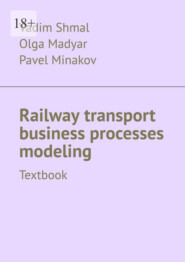
Полная версия:
Railway transport business processes modeling. Textbook

Railway transport business processes modeling
Textbook
Vadim Shmal
Olga Madyar
Pavel Minakov
© Vadim Shmal, 2022
© Olga Madyar, 2022
© Pavel Minakov, 2022
ISBN 978-5-0059-2516-9
Создано в интеллектуальной издательской системе Ridero
1 BUSINESS MODELS, THEIR DEVELOPMENT HISTORY AND CLASSIFICATION
1.1 Business modeling development history
In the business modeling development history, there are four stages based on a conceptual approach to the organization management (Figure 1.1).
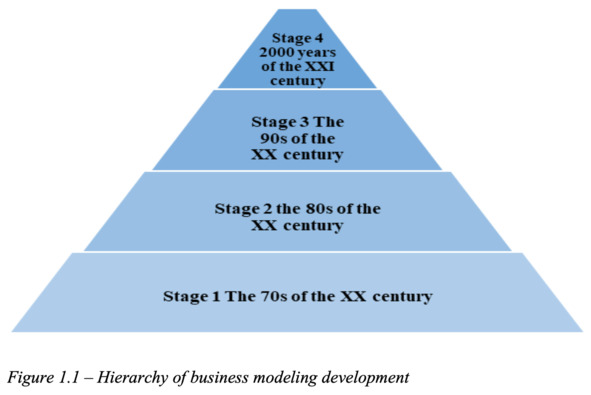
At the first stage of business modeling development, the implementation of large-scale projects in various activity fields began. There has been a change in the production conditions of commercial and manufacturing companies, which has led to a number of problems arising in the organization activities. The problem analysis revealed disadvantages in the work of the organizational and technical system, which provides for the work of personnel, equipment, software and ways of their interaction.
Therefore, it was proposed to develop adequate ways of interconnecting the presented elements. The most well—known methodology is the structural analysis methodology and design of SADT systems, which was developed by Douglas Ross in 1973.
In the second stage, the development of enterprises activities describing methods gained popularity, due to the widespread introduction of personal computers and the development of information systems. The most popular organization describing methodologies at this time are modeling using data flow diagrams of various notations, developed by Jordan De Mark and Gainar-Sarson, information modeling by Chen Barker using entity-relationship diagrams, modeling of business processes of EPC notation, dynamic, functional analysis based on various types of Petri nets and the creation of a separate areas of software using CASE technologies (Computer-Aided Software/System Engineering), which have the ability to automate the work of software development specialists.
The third stage is characterized by the appearance of the first software products designed to solve organizational problems of enterprise management. During this period, the business environment is fundamentally changing, CASE tools are changing, which are no longer intended for automating processes, but for implementing a wide range of tasks of business analysis of enterprises’ activities. CASE models began to cover the full cycle of control system building (Figure 1.2).
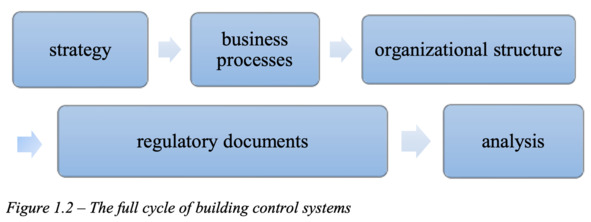
A separate class of programs designed to solve management organizational issues and business modeling is being added – «BMS» (Business Modeling Software). The business model of this class includes a system of company goals, models of business processes and organizational structure of the company, as well as a reference book on the documents used. Business modeling during this period is inextricably linked with the" drawing development" of the organization, as the graphical representation allows you to make the company’s business model more transparent, accessible to the clients understanding, ready for regular analysis, management and further improvement.
The fourth stage is associated with the development of business modeling to a separate management methodology, which is called «business engineering». This methodology consists in analyzing and improving the company’s activities through the use of a process approach. A prerequisite for the success of the company is the availability of internal changes skills and their systematic application. Constant monitoring, analysis and continuous improvement of the company’s activities are among the main tasks of the new divisions.
1.2 The concepts of «business modeling» and «business model». Key elements and structural blocks of business models
A business model includes a combination of two concepts: a business and a model. A business is an economic or entrepreneurial activity aimed at making a profit systematically. A model in the usual sense is an abstract description of an object in some form that differs from the form of real execution. It follows from these concepts that a business model is an analytical, conceptual tool designed for the abstract description of various types of activities, the study of a complex business system, aimed at making a profit and reflecting the logic of the business.
The business model is used to describe the basic principles of the creation, development and successful operation of the organization. The details of the business model are determined by the goals of modeling and the accepted point of view. Within the framework of the business model, all objects, processes, rules for performing operations, the existing development strategy, as well as criteria for evaluating the effectiveness of the system are displayed.
The process of finding out or reproducing the properties of complex business systems, using an abstract description in the form of graphical components, mathematical equations, diagrams, plans, algorithms and programs is business modeling.
To determine the essence of the concept of a business model, two approaches are identified.
The approach directed inside the enterprise implies considering the activities of the enterprise from the point of view of business processes and technologies. The second approach involves focusing on the values of customers for whom the company should create a favorable environment, and this approach is also aimed at the results of the activities of this enterprise.
To date, there is no single point of view and a single definition of «business model».
To determine the content of an enterprise’s business model, several key factors are identified (Figure 1.3).
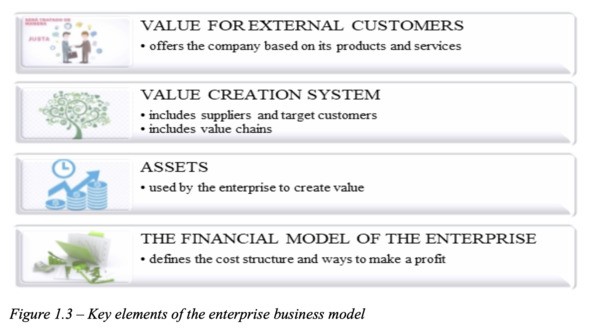
The concept of a business model is quite new. Schematically, Alexander Osterwalder was able to reflect it in 2004 in the form of a drawing according to which the company operates. In his opinion, the work of absolutely any company can be described in nine blocks. These blocks describe the scheme of the company’s work, its resources and main processes (Figures 1.4) [2].
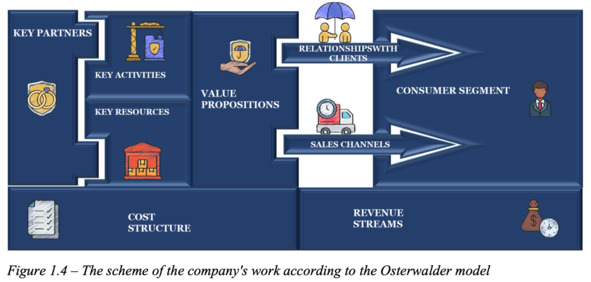
As can be seen from the structure of the company’s work scheme, all the details of the company’s activities were covered by two approaches – inside the company and directly with external customers.
1.3 The main stages of building a enterprise business model
Business modeling is an ambiguous process and it is never possible to accurately predict the demand for a company’s activities. It is possible to formulate an abstract business model of an enterprise by creating its template – a general scheme consisting of 9 blocks (Figure 1.5) reflecting the logic of the work of any company (Figure 1.6).
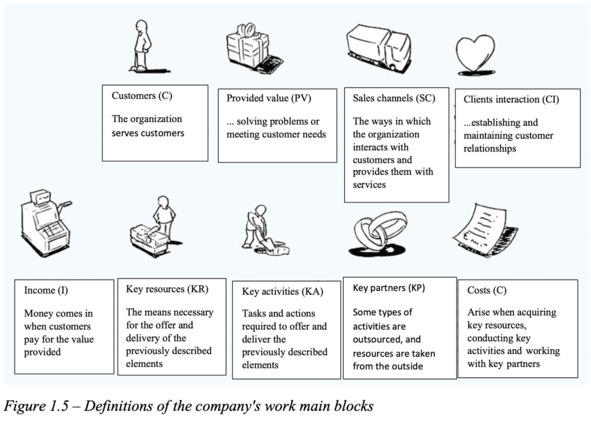
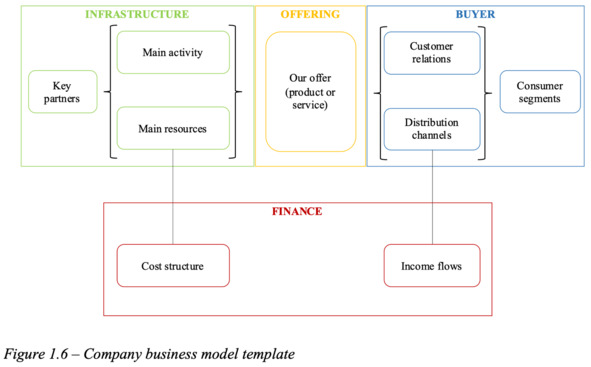
1 Block – Consumer segment (customers).
This block determines the consumer base of the company, because the client is the heart of the business model, from which the main blocks will be based. Consumer segments are divided into 6 categories, the difference of which is due to differences in offers, requests and sales channels (Figure 1.7).

2 Block – Offer (provided value).
The offer block reflects a certain value for the segment of consumers, which can be both quantitative and qualitative. The value of the offer can be formed by the elements presented in Figure 1.8.
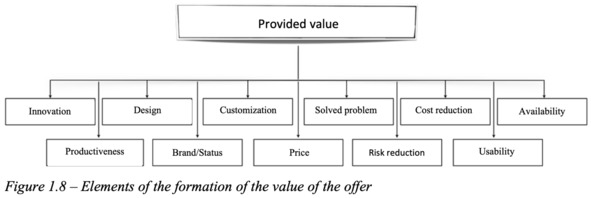
3 Block – Distribution channels (distribution channels)
Distribution channels have several phases and can be divided into direct, indirect, as well as own and partner. The stages of product promotion to the consumer are shown in Figure 1.9. Product promotion channels may include all or some stages.

Block 4 – Customer Relations
Customer relationships are divided into several types, for a certain segment of consumers, these relationships can be implemented in parallel. The customer relations block helps to answer frequently arising questions of cost, implementation in practice, segmentation of consumers for a certain type of relationship, etc. The types of customer relationships are shown in Figure 1.10.

5 Block – Income flows (revenues)
Revenue flows exist for each consumer segment. They can be single for each segment, and several flows can be intended for one consumer segment. Revenue channels may have an individual pricing mechanism. Ways to create revenue streams are shown in Figure 1.11.
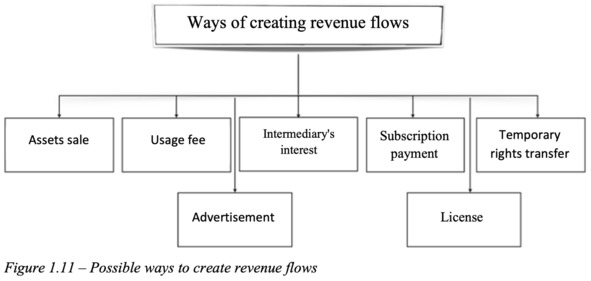
Block 6 – Core resources (key resources)
Key resources primarily allow you to make a profit, as well as provide an opportunity to inform customers about your offers and ensure relationships with your target audience. The type of use of key resources also depends on the classification of the business model (Figure 1.12).
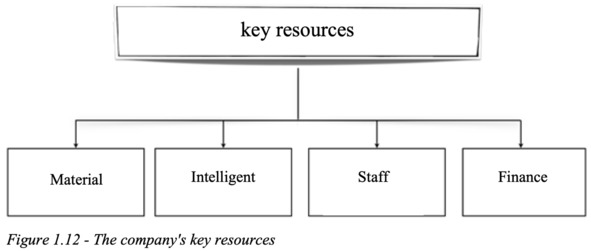
Block 7 – Main activity (key activities)
The main activity of the company is divided into 3 categories (Figure 1.13). The activity block helps to determine the appropriate distribution channels, the main actions necessary for the implementation of a product or service, as well as answer questions about further customer relations and determine the method of revenue flow.
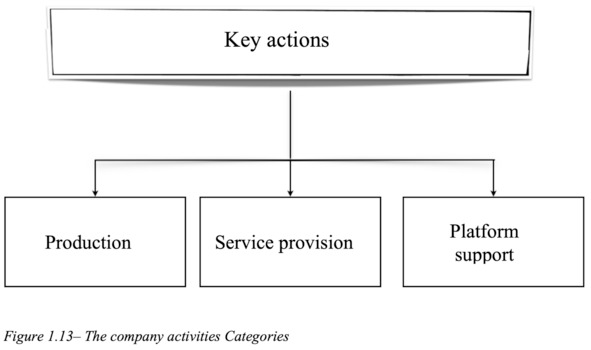
Block 8 – Key Partners
During the work of the company, relationships with partners are built. There are three main motives for creating partnerships: optimization and economies of scale, reduction of risks and uncertainty, acquisition of certain resources and activities. Key partners can be divided into 4 classification groups (Figure 1.14). Partnership is necessary to support the company, its functioning through the attracted infrastructure, optimization, production savings, as well as in the framework of logistics (supplies) and joint activities.
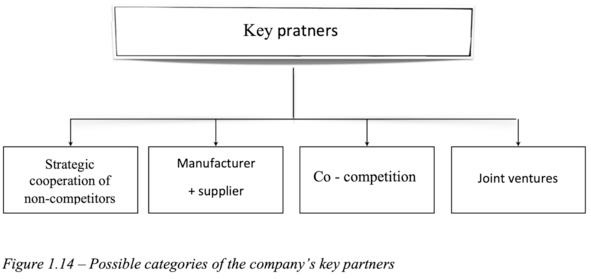
9 Block – Expenses structure
Any business model should be based on minimizing expanses. In this block, it is possible to determine what expenses the company will have for the functioning of its business model. There are two broad classes of expenses structure: the focus on expenses and the focus on value, where most business models lie between these classes. The former always strive to ensure minimized expenses for providing their value, and the latter to ensure the quality of their products. Expenses, in turn, can also be divided into groups (Figure 1.15).
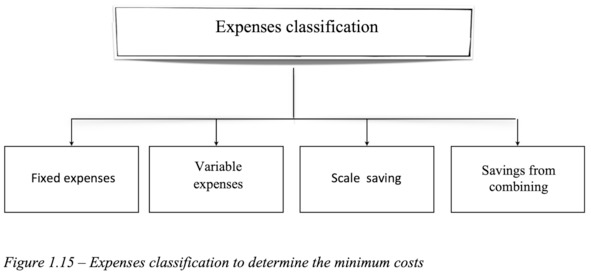
1.4 The business model of the Russian Railways Holding
The generalized business model of the Russian Railways holding company can be clearly demonstrated using the Osterwalder model. The main blocks of the model are shown in Figure 1.16.
In the target model of the Russian Railways holding, there are 5 blocks on which the main work of the company takes place (Figure 1.17) [4].
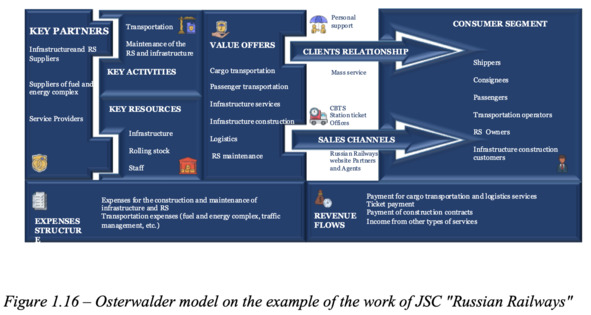
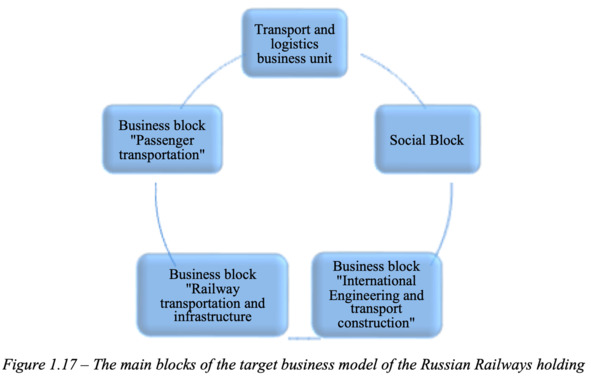
1 BLOCK – Transport and logistics business block
The main priority in this block is the formation of a diversified product basket of the holding. The cargo owner offers comprehensive integrated services according to the main logistics principle «door-to-door delivery of cargo», but with an additional expanded range of services from 2PL to 3PL, 4PL.
The main functions of the block:
– work with shippers;
– development and formation of transport services;
– development of operator and logistics activities.
The above-mentioned functions and performance of the business unit are carried out by subsidiaries and divisions of JSC Russian Railways, the largest of which are JSC FСC, JSC UTLC, GEFCO and others.
BLOCK 2 – Business block «Passenger transportation»
The business block is aimed at developing offers to consumers of transport services, by accelerating and increasing the multimodality of transportation, improving the quality of traditional service, improving additional and related services.
The main functions of the block:
– provision of passenger, baggage and cargo transportation services;
– passenger service and maintenance of passenger trains.
Passenger transportation activities are organized in suburban traffic by 25 suburban passenger companies, the Directorate of High-speed Communication, JSC «FPC».
BLOCK 3 – Business block «Railway transportation and infrastructure»
This block is the largest block in JSC «Russian Railways», as it plays a key role in the work of the holding. Priority areas of development in this block are to reduce costs, develop new and improve existing transportation and logistics products, purchase and modernize infrastructure for increasing traffic volumes.
The main functions of the block:
– ensuring an uninterrupted transportation process;
– management of train traffic and traction resources;
– development, repair and maintenance of railway infrastructure.
The block’s activities are carried out by structural divisions of JSC «Russian Railways», such as the Central Directorate of Infrastructure, the Directorate of Traction, the Central Directorate of Traffic Management, the Central Directorate for Railway Track Repair, the Directorate for the Repair of Traction Rolling Stock.
BLOCK 4 – Business block «International Engineering and Transport Construction»
This block strengthens and expands the Holding in the international transport market, affects the expansion of other types of business as contractors in the construction of infrastructure facilities.
The main function of the block:
– provision of services for the design, construction, supply of necessary equipment for the maintenance and operation of infrastructure facilities being created.
Activities within the business block are carried out by divisions of Russian Railways International LLC and RasonConTrans Joint Venture.
5 BLOCK – Social block
This block is based on an objective assessment of the added value, which is created due to the social support of the team and the effective use of the block’s assets to provide market services. The main priority is the social and public policy of the Holding, which is carried out outside the collective.
The main function of the block:
– carrying out activities on social responsibility to employees, society and the state.
The activities of the social block are carried out by structural divisions of JSC «Russian Railways»: the Department of Social Development, the Department of Personnel Management, the Department of Organization, Remuneration and Motivation of Labor, JSC «Russian Railways Health».
2 CUSTOMER ORIENTATION IN THE FIELD OF FREIGHT TRANSPORTATION
2.1 The concept of customer orientation and its role in the field of freight transportation
The undisputed leader in Russia in the transport services market is the largest Russian Railways holding, in terms of a wide geography of transportation and volumes. Despite the leading position in terms of transportation volumes, it is also necessary to take into account the level of financial and economic activity of the company. It is not always possible to get a high percentage of profitability from the price factor, since the tariffs of JSC «Russian Railways» for most services are regulated directly by the state, while imposing obligations to carry out more socially significant transportation instead of commercially efficient. At the same time, in many market segments, JSC «Russian Railways» operates in conditions of intense competition with alternative modes of transport.
The Company needs to develop non-price competitive advantages, which are based on the formation of a strategy to improve the quality of services provided and the level of customer service.
Customer orientation is the main element of anti-crisis management, which offers the Holding additional advantages, especially during a downturn in traffic volumes.
The interpretations of the concept of customer orientation are closest to the working conditions of the Russian Railways holding, in understanding the company’s ability to create an additional flow of customers and additional profit [1].
The main objective of the Holding is a mutually beneficial long-term partnership with customers, the constant development of a portfolio of products and services in the interests of consumers.
For the Holding, which has more than 30 types of business in its portfolio – from freight and passenger transportation, from logistics, construction services, design, IT and even healthcare, a cardinal reversal of all resources and processes towards the client is a unique task covering all processes, from planning to the direct implementation of transportation and its resource provision. It is made even more unique by regulatory conditions, social responsibility and a special role in the country’s economy, determined by the main shareholder – the state.
The model of Russian Railways that has existed up to now, where 90% of business depends on the basic rail transportation service, with tariffs regulated by the state, cannot generate a financial flow to implement the necessary level of investment. The new business model, defined by the Development Strategy of the Russian Railways holding for the period up to 2030, provides for the transformation of the company from a transportation to a transport and logistics company, providing, in addition to the basic transportation service, a full range of services with the expansion of the range of 3PL, 4PL services and the formation of end-to-end supply chains in the cargo segment and multimodality – in passenger transportation.
To form non-price competitive advantages of the Company today, it is necessary to develop and implement a strategy in the field of improving the quality of services provided and the level of customer service. As long as there is no customer orientation, full fulfillment of all obligations on the part of the railway, well-coordinated work between all structural divisions, the cargo will go to other alternative modes of transport, and the railway will have heavy losses.
2.2 Tasks and activities of the Department of Business Development and Customer Orientation
In December 2014, the Department of Business Development and Customer Orientation was established.
The main goals of the Department, fixed in the regulations approved by the President of the company, are (Figure 2.1) [8]:
– formation and implementation of a strategy for customer-oriented activities of the divisions of JSC «Russian Railways» and its subsidiaries in order to maximize customer demand for the services of the holding of the required quality as a basis for increasing its economic efficiency;
– ensuring the achievement of the strategic objectives of the production and economic activities of the Russian Railways holding and the established parameters of its effectiveness through business development and customer orientation.
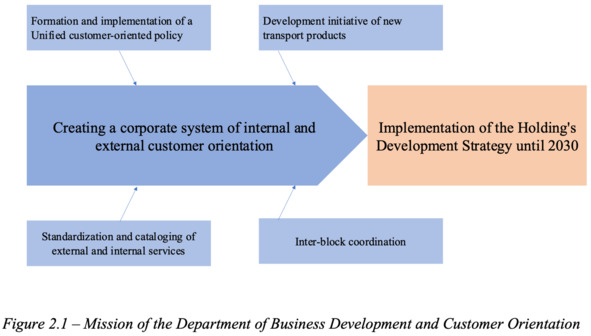
To fulfill these goals, the new department focused on the following main areas of activity:
1) development of corporate policy of internal and external customer orientation of the Russian Railways Holding;
2) organization of the development of new transport products and the formation of an optimal portfolio of services provided by the Russian Railways holding to external customers, taking into account the exclusion of intra-holding competition;
3) coordination of the interaction of business units in order to ensure the balance of their activities aimed at business development and customer orientation;
4) development of tools for researching the needs of internal and external customers and assessing their satisfaction with the quality of services;
5) development of industry standards and creation of a unified catalog of internal and external services of the Russian Railways holding.
The Department of Business Development and Customer Orientation was abolished in 2015 and now the model of a customer-oriented company is formed by the corporate system of internal and external customer orientation of Russian Railways.
2.3 Corporate system for the development of customer orientation formation of the Russian Railways Holding
In 2010, the concept of «Customer orientation» was fixed in the Model of corporate competencies of JSC «Russian Railways» «5K+L» as one of the main values of the Company’s brand. The world does not stand still: technologies are rapidly developing, the level of digitalization of transport is growing, customer needs are changing, which means that the strategic objectives of the company are also changing. In order to develop and improve the customer-oriented approach in JSC «Russian Railways», extensive analytical work was carried out with the participation of a large number of managers, including top managers of the company, and in 2019 an updated model of corporate competencies of JSC «Russian Railways» was approved, which consists of 8 blocks: innovativeness; customer orientation; responsibility for the result; organization of work process; teamwork and mutual assistance; development and care of employees; integrated thinking; effective communication.
Each of the 8 corporate competencies has a different interpretation of concepts for each level of employees and is divided into two types: professional and corporate.
There are four management levels of the Russian Railways holding company. The first three levels include managers, the degree of importance begins with the first level of managers, which is evaluated at the Corporate University of JSC «Russian Railways», the second and third levels include positions from the deputy head of the linear enterprise to the deputy head of the service. The fourth level includes workers and specialists of the holding.
Personnel evaluation is one of the main tasks for a systematic unified personnel reserve, since in the process of this procedure, the qualification knowledge of employees and the assessment of the effectiveness of performing due duties are determined.
There is a single stage in the development of customer orientation in large Russian and foreign holdings.

